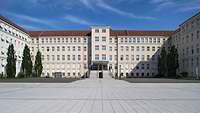
The Bendlerblock
The Bendlerblock is uniquely symbolic of the light and dark sides of recent Ger-man military history. In addition to being the site of a memorial to the German resistance against Hitler, it is the defence ministry’s second …
In 1950, the German government appointed Theodor Blank as the Chancellor’s Commissioner for Questions with Regard to the Strengthening of Allied Troops. With an initial staff of 20, the Blank Office began planning the rearmament of West Germany. Shortly after the country acceded to NATONorth Atlantic Treaty Organization in June 1955, the Blank Office (whose staff by then had grown to 1,300) was renamed the Federal Ministry for Defence. Theodor Blank, who had lent his name to the office, became the first Minister for Defence of the Federal Republic of Germany.
While the Blank Office was at Ermekeil Barracks in the south of Bonn, the new ministry was housed at a modern barracks with space for 1,000 or so people on a hill in the Hardtberg district known as the Hardthöhe. From the 1960s, additional buildings and offices were built at the 80-hectare site to accommodate the rising number of personnel employed there. The large central area alone covers some 50,000 m2. The complex continued to grow well into the 1990s. Today, it consists of over 100 buildings, many of which are listed.

The Bendlerblock is uniquely symbolic of the light and dark sides of recent Ger-man military history. In addition to being the site of a memorial to the German resistance against Hitler, it is the defence ministry’s second …
After reunification, the Hardthöhe was confirmed as the first official seat of the Ministry of Defence by the Berlin/Bonn Act. Since 1993, the Bendlerblock in Berlin has been the ministry’s second official seat. The Hardthöhe now also houses diverse Bundeswehr agencies, among them the Federal Office of Infrastructure, Environment Protection and Services, the Communication and Information Systems Command and the German Joint Support Service Headquarters. Today, more than 2,000 military and civilian personnel are employed at the ministry and the various agencies.